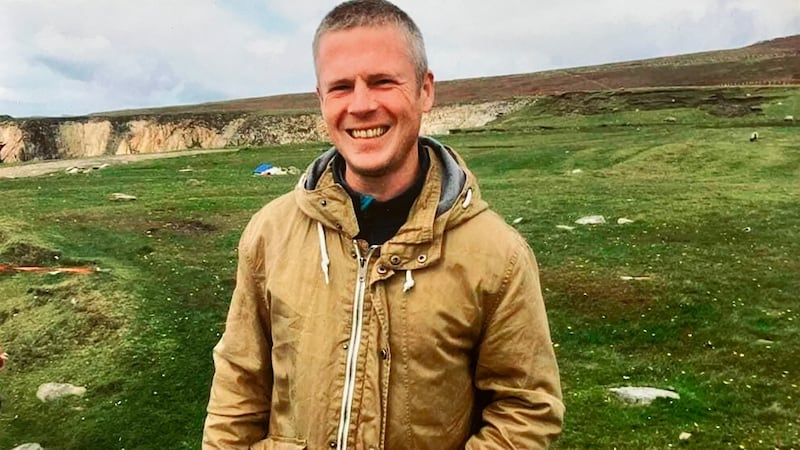You would need a heart of stone not to laugh at Leo Varadkar and Chris Heaton-Harris, the Northern Secretary, arguing at the launch of a peace fund. As a political farce it is only bettered by the line in Dr Strangelove: “Gentlemen! You can’t fight in here. This is the war room.”
The Taoiseach can justifiably feel aggrieved by how the row began last Thursday, when he gave an interview to RTÉ. Asked about the crowds attending the Wolfe Tones at Electric Picnic, Varadkar said he expected to see a united Ireland in his lifetime – something he has suggested before, in 2021. However, he repeated it only to explain why singing republican ballads is counterproductive and unionists should be respected. Then he compared fans of rebel music to southern American racists, a brave analogy for any Irish politician to make, especially with such music drawing new crowds.
Unionists were still unhappy. Varadkar had not condemned the Wolfe Tones enough, it seemed. News coverage did not help by emphasising his united Ireland comment, although this avoided a republican and possible wider nationalist backlash against the rest of his interview.
Varadkar’s subsequent week of wobbles could be seen as overcorrecting to avoid appearing too soft to unionism. Or as Heaton-Harris put it: “The Taoiseach’s got a lot of domestic politics on his plate.”
READ MORE
Of course, a united Ireland is a legitimate aspiration and everyone must be free to discuss it. But Varadkar has conceded he should sometimes exercise caution
Monday’s launch of the €1 billion PeacePlus fund, the post-Brexit successor to EU peace funding, was doomed from the start because Varadkar’s Government issued an early press release on Sunday trying to claim undue credit for it.
This was highly irresponsible, as all sides knew a united front was essential on the now-sensitive issue of EU involvement in Northern Ireland. A joint statement from London, Brussels and Dublin had been agreed on Friday but embargoed until Monday afternoon.
Initial media reports depended heavily on Dublin’s press release, omitting that London was providing most of the money.
Varadkar, Heaton-Harris and the EU’s Maroš Šefčovič sat politely through the launch but swords were drawn in follow-up interviews.
Asked about restoring Stormont, the Northern Secretary said talks with the DUP were making “substantial” progress but the Taoiseach’s comments about a united Ireland and other remarks about a “plan B” were “unhelpful” as they distracted from restoration efforts and upset the unionist community.
Varadkar disagreed, saying restoration was proceeding at “a snail’s pace, if at all” and alternative arrangements must soon be discussed, although he clarified joint authority would breach the Belfast Agreement.
This might have been considered a refreshingly honest, if undiplomatic, assessment – were it not laughable to propose a new British-Irish arrangement while picking a fight with Britain’s minister in Northern Ireland.
Monday was exactly what it looked like: an ill-tempered fiasco
Varadkar also defended the right to mention Irish unity without it being denounced as unhelpful. “It is not the first time I have expressed my view that I would like to see a united Ireland in my lifetime,” he said. “Every time I say it, it is not the right time. So I would often ask the question: when is the right time?”
Of course, a united Ireland is a legitimate aspiration and everyone must be free to discuss it. But Varadkar has conceded he should sometimes exercise caution. Asked at Davos in January if he believed he would see a united Ireland in his lifetime, he declined to answer, noting protocol talks were at “a sensitive point” and he did not want to say anything “provocative”.
Was there also a subtle downgrade from last Thursday’s comment on expecting a united Ireland to Monday’s “would like to see”? If so, it was a moment of nuance in a blundering mess of a trip to Belfast.
[ The Long Game: Inside Sinn Féin by Aoife Moore - Readable and revealingOpens in new window ]
It is fanciful to hope this was some choreographed game of good cop/bad cop to put pressure on the DUP. Monday was exactly what it looked like: an ill-tempered fiasco.
Ironically, the Northern Ireland Office was preparing to pressurise the DUP before Varadkar interrupted. On Tuesday, Heaton-Harris’s junior minister, Steve Baker, gave the unionist party a roasting, accusing it of avoiding Stormont to placate a small number of hardliners. “If you want Northern Ireland in the union, it’s going to need a government,” he warned.
Heaton-Harris and Baker appear to be playing their own game of good cop/bad cop. That suggests Varadkar is right to be pessimistic about Stormont but it also shows Monday’s squabbling was pointless. The Taoiseach could have been the statesman and soared above it.
Much of the febrile behaviour of the past week, north and south, is a reaction to the rise of Sinn Féin. Apart from some gloating over the Wolfe Tones by individual representatives, the party has restricted itself to positive statements about the peace fund and the return of devolution. So it has emerged the winner by being as unargumentative as possible, supplying the lesson and the punchline to it all.














